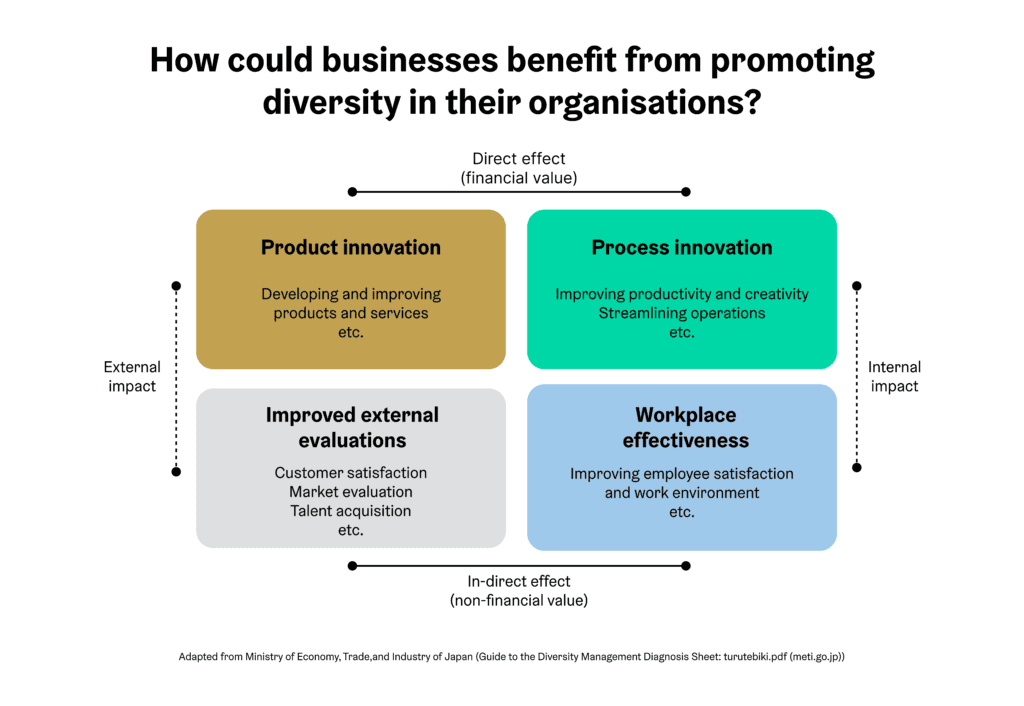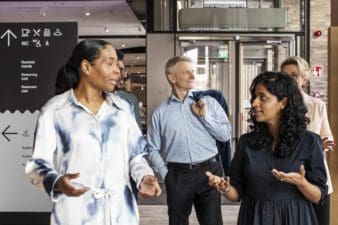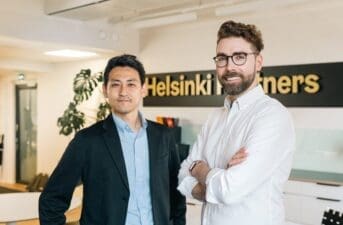The link between DEI and innovation: Insights from Finland and Japan
Diversity, equity, and inclusion (DEI) is just good business sense. Learn how DEI can drive innovation, improve decision-making, and accelerate growth.

6 min read
- Diversity, Equity, and Inclusion (DEI) are essential for driving innovation and growth in businesses, with Finland and Japan serving as key examples of how these principles are applied in different cultural contexts.
- Finland exemplifies the integration of DEI in business and education, with practices like inclusive game development and progressive gender equality legislation, showcasing a long-standing commitment to these values.
- Helsinki Partners promotes DEI in Helsinki by facilitating international talent recruitment for Finnish companies and offering the 90 Day Finn Program to attract global business leaders and innovators.
Sustainability concerns like climate change and human rights issues are changing the business landscape and posing serious risks to companies’ survival. According to a KPMG Japan CFO survey, the top three sustainability-related issues affecting corporate value are human capital, climate change, and diversity.
As diversity, equity, and inclusion (DEI) is now seen as a social issue rather than a personal issue, companies are increasingly recognising that DEI initiatives are no longer a “nice to have” but key to effective leadership. A management approach that prioritises inclusivity and equity is crucial to address changes like economic globalisation and ageing populations.
In this article, we’ll delve into insights from Finland and Japan on embracing diversity in business, covering mutual learnings from both countries that we discovered during a DEI event we organised in Japan.
Reasons to advance DEI efforts are essential to innovation.
Diverse and inclusive organisations are 76% more likely to see ideas become productised and have 19% higher innovation revenues. They are also better able to attract and retain talent 83% of Gen Z job seekers said that a company’s commitment to diversity and inclusion is important when choosing an employer. It also can boost team performance and financial results, companies with ethnically diverse teams are 36% more likely to outperform their peers on profitability. Improve decision-making and lower risks. Diverse decision-maker teams have a 30% increase in their ability to spot risks.
The positive impacts of DEI in Finland
In Finland, teaching innovation and promoting inclusivity and individuality already begins when a child starts school. In the renowned Finnish educational system, there’s a strong focus on co-creation, critical thinking, and emotional skills.
Finland has been at the forefront of advancing gender equality for decades and is the third-most gender-equal country in the world. Considering Finland’s modern history as a small nation, all adults, including women, were required to contribute to the workforce during wartime. Women took up crucial roles in industry and communications, irrevocably changing the position of women both in the home and in society.
I feel like everyone is equal in Helsinki regardless of their skin tone, religion and gender.
Basma Ragab, My Freedom Stories from Helsinki
Today, there are several DEI requirements in Finland, including:
- Equality & Non-Discrimination Acts
- European Accessibility Act
- Gender Equality EU Directive
- Pay Transparency EU Directive
- Gender Equality Plan
Many Finns agree with the DEI imperative. In fact, 95% of employees at leading companies in Finland believe DEI is crucial for future competitiveness. And on average, 90% of employees in Finland who definitely plan to stay at their current company deem their culture inclusive.
While Finnish companies are at different stages of DEI maturity, there are some stand-out DEI initiatives. For instance, Nordic-based global DEI agency, deidei, published a DEI Playbook with a curated collection of best practices to help companies on their DEI journey. Global DEI consultancy Inklusiiv also helps organisations drive real DEI change.
Top gaming companies like Supercell and Rovio are bringing more transparency to their work in DEI. Supercell’s strategy emphasises that the company won’t achieve the diversity required for innovation unless it first embraces inclusion—organisations with inclusive cultures are six times more likely to be innovative and agile. And Rovio’s playbook for inclusive game development outlines best practices for collective insight, serving as a catalyst for industry-wide reflection.
We have seen that diversity makes our teams better. Future workplaces will be fundamentally international.
Ilkka Paananen, CEO, Supercell
Several organisations in Finland also support international talent attraction. At Helsinki Partners, for example, we work with Helsinki-based companies to attract international talent to the city and tap into a diverse global workforce.
Väestöliitto and Business Finland also collaborate with employers who want to improve their diversity and inclusion skills, find international talent, and develop the effectiveness of multinational teams.

DEI developments in Japan
Japanese and Finnish cultures share many similarities, including great respect for nature, common sustainability and ESG goals, and a strong emphasis on technology and innovation. For example, Japanese investors like NordicNinja choose Helsinki as their main international office to reach the rest of Europe. Helsinki was also the ideal launchpad for Junkan’s groundbreaking initiatives in textile sustainability.
Despite the diversity in Asia, DEI initiatives are not too common. For example, a BCG survey reveals that only 58% of Southeast Asian businesses have DEI initiatives, much lower than the global average of 96%. In Japan, gender inequality is a big issue: the country ranked 125th in the World 2023 Economic Forum (WEF) Global Gender Gap report—the lowest among G7 countries and in the East Asia and Pacific region.
However, DEI is becoming increasingly important in corporate Japan, and many DEI initiatives are driven by regulatory reform. The Ministry of Economy, Trade, and Industry (METI) in Japan has new policies related to the promotion of diversity management, the encouragement of women’s empowerment, the promotion of neurodiversity, and the promotion of foreign human resources.
In 2022, the Japanese government amended an act to obligate companies with 301 or more full-time employees to disclose gender pay gaps. TSE Prime Market companies will have to have at least one female board member by 2025 and reach a 30% target by 2030.
Up until now, the primary goals of work have been to improve productivity or beat the competition in order to increase profits or scale of business. […] Going forward, however, businesses will need to help resolve the various issues impeding the realisation of a sustainable society and environment in order to contribute to the happiness of all stakeholders.
Hiroshi Aoi, CEO, MARUI
Many business leaders see the importance of fostering a culture of DEI within their organisations, taking both a top-down and bottom-up approach. Leaders from organisations like Dentsu and Idemitsu Kosan, for example, emphasise that companies can’t be competitive in the marketplace without DEI, and that it’s essential to business transformation.
DEI at Helsinki Partners
We promote diversity, equity, and inclusion in Helsinki by helping Finnish companies recruit international talent and by connecting them with people and organisations that address other aspects of DEI. In 2023, we successfully conducted a series of workshops focused on DEI for all staff and specifically our leadership team, from building inclusion to improving accessibility in social media channels. As we continue to build on these foundations, we look forward to formalising our DEI initiatives.
Our commitment to understanding DEI issues can help Japanese corporations navigate the local business practices and social norms in Helsinki. By working with a DEI-focused organisation, you’ll ensure your corporation aligns with international compliance and ethical standards, which is increasingly important in global business operations.
Ready to experience Helsinki for yourself? The 90 Day Finn Program provides international professionals the opportunity to spend up to 90 days living and working in Finland’s vibrant capital to identify business opportunities.
Why join?
- Expert guidance: Access personal business advisor services, including tailor-made consultancy, direct introductions, and data gathering.
- Relocation support: Ensure a hassle-free relocation for you and your family, plus a virtual preparatory program with other participants.
- Rich experience in Helsinki: Access co-working spaces, weekly networking events, business visits, and cultural activities—plus a local friend and peer support to help you settle in.
Learn more about the 90 Day Finn Program
Our celebrated 90 Day Finn Program is back, and now accepting applications for its fourth round. Designed for international corporate executives and innovation leaders, this program offers a rare opportunity to identify business opportunities in Finland’s thriving capital.

Related articles
Contact Helsinki Partners
If you are interested in learning more about Helsinki and its possibilities – please contact us via the form here. We’ll make sure to get back to you within a few working days.


